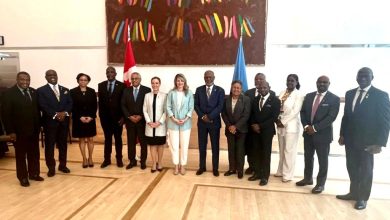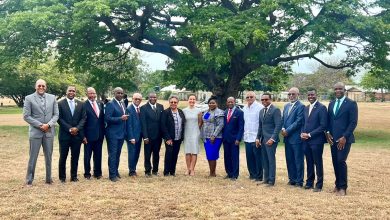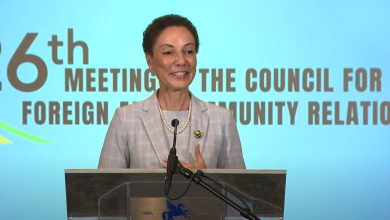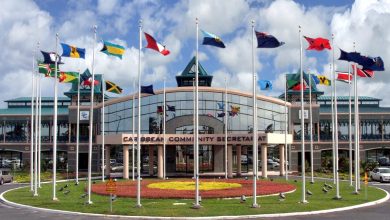(Caribbean Community Secretariat, Turkeyen, Greater Georgetown, Guyana) The Fifteenth Meeting of the Council for Foreign and Community Relations (COFCOR) of the Caribbean Community (CARICOM) took place in Paramaribo, Suriname, on 3-4 May 2012, under the chairmanship of His Excellency Winston G. Lackin, Minister of Foreign Affairs of Suriname. The Council Meeting was attended by Senator the Hon. Maxine McClean, Minister of Foreign Affairs and Foreign Trade of Barbados; Hon. Wilfred Peter Elrington, Minister of Foreign Affairs and Attorney-General of Belize; Hon.I. J. Karl Hood, Minister for Foreign Affairs, the Environment, Foreign Trade and Export Development of Grenada; Hon. Carolyn Rodrigues-Birkett, Minister of Foreign Affairs of Guyana; Hon. Arnaldo Brown, Minister of State, Ministry of Foreign Affairs and ForeignTrade of Jamaica; Hon. Alva Romanus Baptiste, Minister for External Affairs, International Trade and Civil Aviation of Saint Lucia; and Dr. the Hon. Surujrattan Rambachan, Minister of Foreign Affairs and Communications of Trinidad and Tobago.
Ambassador Anthony Liverpool, Director General of the Ministry of Foreign Affairs, represented Antigua and Barbuda, and Mr. Elvis Newton, Permanent Secretary of the Ministry of Foreign Affairs, represented St Kitts and Nevis.
The Foreign Ministers of the Caribbean Community met against a backdrop of global, hemispheric and regional trends. The COFCOR focused on the continued impact of the global economic and financial crisis on the economies of the Community and the attendant outreach efforts to sensitize the members of the G-20 to its concerns and needs; adverse developments for small island developing and low-lying coastal states in the continuing international negotiations on climate change and on sustainable development; engagement with traditional and non-traditional partners in the context of the Community’s strategic priorities; concerns over emerging trends in the provision of technical assistance, and cooperation by the Community’s International Development Partners (IDPs); security cooperation with external partners; implications of the establishment of the CELAC for the foreign policy positioning and coordination of the Community; and worrisome developments in some Associate Members of the Community.
Opening Ceremony
The need to enhance foreign policy coordination in the Caribbean Community (CARICOM) in a constantly changing international climate was the common thread in the addresses at the Opening Ceremony by His Excellency Winston Lackin, Foreign Affairs Minister of Suriname and Chairman of the COFCOR, and Ambassador Irwin LaRocque, Secretary-General of CARICOM.
Minister Lackin called for more effective coordination of foreign policy to respond to the changing international environment and for determining the Region’s international agenda”.
He emphasized the importance of COFCOR’s collaboration with the Council for Trade and Economic Development (COTED) in promoting and developing coordinated policies in a holistic manner in order to enhance external economic and trade relations of the Community.
“Foreign Policy coordination also requires that we, as ministers, and as Member States, participate more pro-actively in multilateral organizations and, where necessary, bring about a reorientation of our focus,” Minister Lackin said.
The Secretary-General pointed out that coordination of foreign policy was essential to address issues such as the continued impact of the global economic and financial crisis on the economies of the Community, and the attendant outreach efforts to sensitize the members of the G-20 and other international decision-making bodies to the concerns and needs of the Region. Coordination was also vital, he said, when addressing the issues affecting small island developing and low-lying coastal states in the continuing international negotiations on climate change and on sustainable development, given the upcoming United Nations Conference on Sustainable Development (UNCSD) Rio+20 in June.
Coordination of Foreign Policy
The Council undertook another in-depth discussion on foreign policy coordination, a mechanism whose institutionalization and critical importance have been the subjects of constant focus. The Council acknowledged the factors that have made the practice of coordination more challenging, especially for small states with limited capacity and resources. These include an increasingly burdened international and hemispheric agenda; drastic systemic and technological changes to the environment in which diplomacy is practised and divergent economic and political interests of individual sovereign Member States. It stressed the need for in-country harmonization on policy matters that impinge on external relations as a prelude to coordination with other Member States.
Emphasizing the need for greater consultation and coordination, Foreign Ministers reaffirmed a number of operational guidelines, including information collection and dissemination, and the more frequent use of modern Information And Communication Technologies. The use of the latter will enhance the consultation and decision making of the Council through continuous contact. The Council underscored the critical need for articulation of common policy positions and consistency of messages. Particular attention was paid to the key coordinating roles played by the Bureau of COFCOR, especially in-between Council meetings, Caucuses prior to bilateral meetings and to the preparatory work of Senior Officials and the Secretariat.
Relations with Third Countries and Groups of Countries
The Council reviewed the Community’s relations with a number of its partners, including Australia, Brazil, Canada, Cuba, Japan, the United Kingdom and the United States of America.
The Council noted the progress made in the strengthening of relations with a number of Third Countries since its last Meeting through, inter alia, meetings at the Ministerial and Heads of Government levels.
The Council further discussed the coordination of positions on a number of issues of strategic interest to the Region in preparation for a scheduled interface with Third countries and groups of countries for the remainder of 2012, including the CARICOM-Mexico Summit, the African Union (AU) Diaspora Summit, both in May, and the Association of Caribbean States (ACS) Summit in July.
Ministers engaged in intense discussions regarding the deleterious effects that the discriminatory implementation by the UK of its Air Passenger Duty (APD) is having on the Region's economies. They denounced in strong terms the negative impact that the tax continues to have on the Region's revenue sources, observing that the tax was distorting trade and compromising the Region's efforts towards sustainable development, including the achievement of the Millennium Development Goals (MDGs). They resolved to redouble their lobbying efforts in the UK, including with the continued support and influence of the Caribbean Diaspora, to vigorously advocate for review of the tax.
The Council agreed on the need for enhanced engagement with the Caribbean Diaspora and the formulation of a regional policy that would provide a platform for mobilising the talents, skills and resources of the communities of Caribbean origin overseas, for promoting trade and investment, national development, policy formulation and advancing the interests of the Community.
Strengthened relations with the Community’s Latin American neighbours featured prominently in the Council’s discussions as they analyzed the Community’s role in hemispheric and sub-regional bodies such as the Community of Latin American States (CELAC), the Association of Caribbean States (ACS) and CARICOM’s continued strategic alliance with Central American States through an intensified relationship between CARICOM and the Central American Integration System (SICA).
With regard to the ACS, the Council welcomed the election of the new Secretary General, His Excellency Dr. Alfonso Múnera Cavadía of Colombia, and looked forward to continued close collaboration under the new administration. The Ministers further looked forward to participating actively in the Fifth Summit of the ACS, to be hosted by Haiti,\ later this year, under the theme “Towards a Renewal of the Vision of the ACS for a Stronger and More United Greater Caribbean”. The importance of active participation by CARICOM Member States in the activities of the organization and in shaping its policy directions was underlined.
The meeting reiterated the importance of ensuring continued vigorous action and leadership in pursuing the operationalisation of the Caribbean Sea Commission, building on the substantial achievements gained through international recognition for this body as a pioneer institution in marine regionalism. The Council called for the establishment of key institutional mechanisms of the Commission, the resourcing of its operations to ensure financial sustainability, and the elaboration of a legal framework for regional and international acceptance.
Interaction with Representatives of Third States
Underscoring the value of engaging with representatives of Third States, the Council adopted policy guidelines in respect of such engagements. In this regard, it was agreed that interaction and cooperation with third states should contribute to mutually beneficial relations, including at the political, economic and technical cooperation levels.
The Council welcomed representatives of a number of Third States. These included His Excellency Antonio de Aguiar Patriota, Foreign Minister of Brazil, His Excellency Erkki Tuomioja, Minister of Foreign Affairs of Finland, His Excellency Willy Claes, Minister in the Royal Council of Belgium, His Excellency Jean Asselborn, Deputy Prime Minister and Minister of Foreign Affairs of Luxembourg, the Special Representative of the Prime Minister of Australia to the COFCOR, the Honourable Richard Marles, Parliamentary Secretary, and Special Envoy of Spain, H.E. Joaquín de Arístegui.
The Council engaged the representatives in fruitful exchanges on CARICOM’s relations with their respective countries. Amongst the issues discussed were political and technical relations, support for candidatures to international bodies, and collaboration on various issues in international fora. The Council also took the opportunity to underscore the interests, concerns and special circumstances of the Caribbean Community, many of whose Member States are categorized as Small Highly Indebted Middle Income Countries (SHIMICS). In addition, the Council brought to the attention of the representatives the issues of the United Kingdom’s Advanced Passenger Duty and the graduation of Member States from concessional financing.
The Council welcomed the offer of Suriname to host the Second CARICOM-Brazil Summit in 2013 which will be preceded by a meeting of the Foreign Ministers of both sides.
Technical Cooperation
The Council exchanged views on the Community’s technical cooperation relations with its International Development Partners, noting its appreciation for the continued assistance received from a number of traditional as well as new development partners, which has provided meaningful support to the Region in the attainment of its development goals. The Council considered the emerging trends of some concern in the aid policy of International Development Partners, such as “differentiation”, which results in the graduation of certain Member States from receiving national development assistance. The Ministers discussed strategies and policies to respond appropriately to such disturbing trends which do not take into consideration the problems of vulnerability of small states.
Candidatures
The Council continued to highlight the importance of CARICOM’s representation on international bodies, particularly where CARICOM’s representation is limited. The Council endorsed a number of CARICOM candidatures, including Minister Audrey Joy Grant of Belize for a seat on the Board of the Green Climate Fund; Ambassador George Talbot of Guyana for a seat on the Bureau of the Second Committee of the UNGA (2012-2013); and Ambassador Henry MacDonald of Suriname for a seat on the Bureau of the Third Committee of the UNGA (2012-2013). The Council also endorsed the candidature of Mr Iwan A Sno for a position on the Statistical Commission of the United Nations for the period 2014-2017.
With regard to the candidacies of Third States which had sought the support of the Community, the Council recalled the decision of CARICOM Heads of Government to endorse Australia for one of the Western European and Others Group (WEOG) non-permanent seats for the United Nations Security Council (UNSC) for the period 2013-2014.The meeting also agreed to support the candidature of the United States of America for the UN Human Rights Council (UNHRC) for the period 2013-2015. The Council expressed support for Brazil’s bid for a permanent seat on the UNSC in the context of the United Nations reform.
United Nations
Underscoring the importance which CARICOM attaches to the United Nations as a principal forum for multilateral exchange, Council members exchanged views on a number of issues being discussed in that forum which are of critical importance to the Region. The Council welcomed the new format of the negotiations regarding UN Security Council reform which has advanced the process.
The Council also noted CARICOM’S leadership role in the bid to erect a Permanent Memorial to honour the victims of Slavery and the Trans-Atlantic Slave Trade and appreciated the efforts made by the Permanent Memorial Committee in the further development of the Project. The Council urged the international community to make contributions to aid in the completion of the project.
Organisation of American States (OAS)
The Council received the Assistant Secretary-General of the Organisation of American States (OAS) and discussed major issues before that body. The Council reaffirmed its commitment to participate actively in the upcoming Forty-Second Meeting of the Organization of American States General Assembly to be held in Cochabamba, Bolivia, on 3-5 June 2012, under the theme, “Food Security with Sovereignty in the Americas”, and agreed on issues of importance to CARICOM to be pursued at that Assembly, including the Secretary-General’s strategic vision for the OAS. The Foreign Ministers noted the outcome of the Sixth Summit of the Americas in Cartagena de Indias, Colombia, on 14-15 April, 2012. The Council re-emphasized the importance of the areas of priority identified by the Region during the Summit of Americas process for funding and technical assistance, namely Maritime Transportation, Information and Communications Technology for Development, and Agriculture and Food Security, and agreed to pursue the concretization of these initiatives.
Climate Change
The Council reiterated that the issue of Climate Change continues to pose a major challenge for the Region and that this item should remain on the agenda of its Meetings. The Council reviewed the follow-up actions from Conference of Parties (COP)-17 (Durban), as well as preparations for COP-18 (Qatar), including the Region’s position for this meeting, and considered emerging issues regarding Trade and Climate Change which are of some concern. The Ministers further reiterated the Community’s endorsement of the Government of Belize’s candidature for a seat on the Board of the Green Climate Fund (GCF).
United Nations Conference on Sustainable Development (UNCSD) Rio+20
The Council also reviewed the Region’s preparations for the upcoming United Nations Conference on Sustainable Development (UNCSD) Rio+20. In this regard the Region supported the call by other developing countries for an additional negotiation session to ensure a successful and mutually satisfactory outcome of the Rio+20, and called for convening of a Third Global Conference on SIDS (Barbados +20) in 2014. The Council looked forward to strong participation of the Community at this important conference.
International Security Issues
The Council considered a number of initiatives for intensifying action, regionally and internationally, and with the cooperation of international partners, to further enhance the Region’s security. In this context, it considered the forthcoming UN Conference on the Arms Trade Treaty (ATT) and the UN Programme of Action to Combat and Eradicate the Illicit Trade in Small Arms and Light Weapons (SALW) to be of special importance to the Community, recognizing the threat that these weapons pose to citizen security. The Council recognisedthat these fora present platforms to advocate for the regulation of the international trade in conventional arms based on the highest possible international standards. The Council reiterated the importance of coordinated CARICOM positions in advance of the respective July and September 2012 Conferences.
The Council also discussed the continued importance of the Caribbean Basin Security Initiative (CBSI) security partnership, and welcomed the recent initiatives of the CBSI Technical Working Groups. Ministers expressed appreciation to the United States Government regarding its ongoing commitment to the CBSI and welcomed the commitments given by other international partners in advancing the implementation of the initiative. The Foreign Ministers noted the ongoing review of the Implementation Agency for Crime and Security (IMPACS) as part of the initiative launched by Heads of Government to make the Community’s institutions more effective.
30th Anniversary of the Opening for Signature of the 1982 United Nations Convention on the Law of the Sea (UNCLOS)
The Council recognized the 30th Anniversary of the opening for signing of the 1982 United Nations Convention on the Law of the Sea (UNCLOS), and the special commemorative session that would be celebrated at the UNGA in December 2012, as well as the special session of the International Seabed Authority (ISA) to be held in Kingston, Jamaica, in July 2012 in this context. The significance of the 1982 Convention to the international community, and the importance of the UNCLOS and the work of the ISA were endorsed by the Ministers.
Border Relations
Guyana-Venezuela
The Council received an update on recent developments in Guyana/Venezuela relations. The Council noted that the Bolivarian Republic of Venezuela had submitted an objection to the consideration of Guyana’s Submission for an extended continental shelf, a Submission made to the Commission on the Limits of the Continental Shelf, pursuant to Article 76 of the United Nations Convention on the Law of the Sea (UNCLOS).
The Council also noted that there is no territorial dispute between Guyana and Venezuela, since the Arbitral Award of 1899 established the land boundary between both States.
The Council expressed the hope that the Commission on the Limits of the Continental shelf would consider Guyana’s Submission.
The Council reiterated the Community’s support for the maintenance of the territorial integrity and sovereignty of Guyana and expressed the hope that the recent regrettable action of the Government of the Bolivarian Republic of Venezuela would not affect the otherwise exceptionally good relations that exist between Guyana and Venezuela. The Council further took note of the continued confidence that both States have in the Good Offices Process of the United Nations Secretary General under the Geneva Agreement of 1966.
Belize-Guatemala
The Council received an update on relations between Belize and Guatemala and their efforts to find a final and definitive resolution to the Guatemala claim. The Council welcomed the agreement reached on 27 April 2012, in Washington DC, USA, to set the date of 6 October 2013, for the holding of simultaneous referenda in both countries, in accordance with the “Special Agreement Between Belize and Guatemala to Submit Guatemala’s Territorial, Insular and Maritime Claims to the International Court of Justice” of 2008.
In this regard, the Council underlined the importance of conducting public awareness campaigns to fully sensitise the respective peoples of both countries on all the issues relating to the finding of a solution in accordance with international law. The Council offered its full support to both countries and called upon the international community to assist both countries in the process of national consultations and in exercising the democratic process.
The Council reaffirmed the Community’s unequivocal support for the territorial integrity and sovereignty of Belize.
Community Relations
The Council engaged in discussions on a number of issues relating to Community Relations, including the Community’s continued assistance to Haiti, the situation in Anguilla and in Turks and Caicos Islands, relations with Overseas Countries and Territories (OCTs) and the Community’s practice of mounting Electoral Observer Missions in CARICOM Member States in keeping with the practice and principles of good governance.
With regard to Haiti, the Council welcomed the acceptance of the eligibility by both Houses of Parliament of the Hon. Laurent Lamothe as his country’s Prime Minister, and looked forward to the approval of his policy statement and his Cabinet by the Parliament in the coming days.
The Council noted the successful outcome of the February 2012 Official Visit of the Bureau of Conference of Heads of Government to that Member State. The Council also welcomed the signing of a CARICOM-Haiti Memorandum of Understanding (MOU) during the visit as a vehicle for strengthening the Community’s support to Haiti.
The Council agreed to seek the support of external partners in the implementation of the MOU and to call on the international community to provide the requisite resources to strengthen and empower the institutional structure and capacity of the Haitian Government. The Council reiterated previous calls on the international community to make good on its pledges to Haiti expeditiously.
The Council further underscored the important role that the CARICOM Special Representative to Haiti continues to play as advocate on behalf of that country, as well as the role of the CARICOM Representation Office in Haiti (CROH) in facilitating the integration of Haiti into the Caribbean Community.
The Council reaffirmed the important role of Civil Society in the regional integration process. It welcomed the renewed thrust which has been facilitated by the EU-funded CARICOM Civil Society Project which culminated in October 2011 with the convening of a CARICOM Technical Meeting of Representatives of Government and Civil Society.
The Council noted the hosting by Suriname of the upcoming CARICOM-UNASUR High Level Youth Meeting in June 2012.
Congratulations
The Council extended hearty congratulations to Jamaica and Trinidad and Tobago on their 50th Anniversaries as independent countries.
Appreciation
The Ministers expressed their deep appreciation to the Government and people of Suriname for the warm hospitality, excellent arrangements and courtesies extended which greatly facilitated the fruitful deliberations of the Fifteenth Meeting of the COFCOR.
Suriname 4 May 2012






